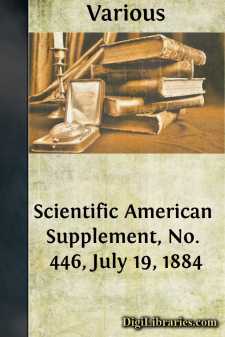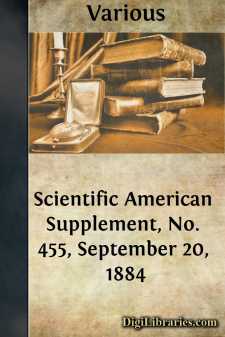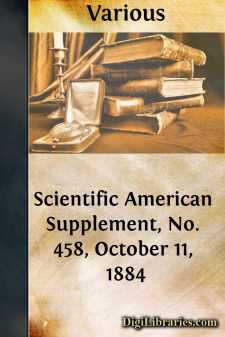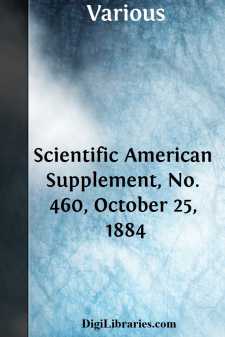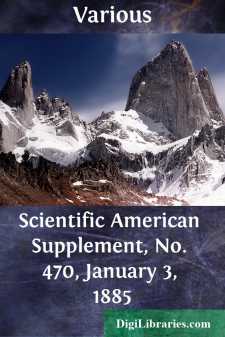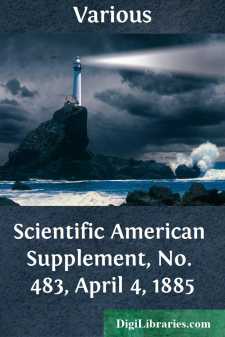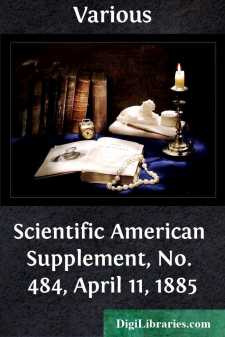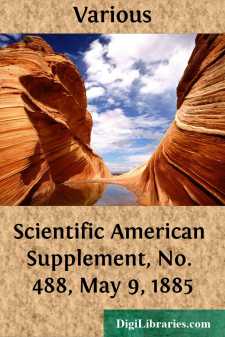Periodicals
- Art 27
- Children's periodicals 59
- Entertainment 5
- Food/Wine 2
- Games/Humor 455
- General 661
- Health 1
- History 53
- House/Home 1
- Regional 62
- Science/Nature 118
- Transportation 10
Periodicals Books
Sort by:
by:
Various
IMPROVED FILTER PRESSES. Hitherto it has been found that of all the appliances and methods for separating the liquid from the solid matters, whether it is in the case of effluents from tanneries and other manufactories, or the ocherous and muddy sludges taken from the settling tanks in mines, some of which contain from 90 to 95 per cent. of water, the filter press is the best and the most economical,...
more...
by:
Various
PROGRESS OF ANTWERP. Antwerp is now the chief port on the Continent. Since 1873 the progress has continued, and made very rapid advances. In 1883 the tonnage of the port reached 3,734,428 registered tons. This marvelous development is partly due to the position of Antwerp as the embarking point from the Continent of Europe to America, and partly also to the recent additions and changes which have been...
more...
by:
Various
THE TEMPERATURE OF THE EARTH AS SHOWN BY DEEP MINES. At a recent meeting of the American Society of Civil Engineers, observations on the temperature of the earth, as shown by deep mines, were presented by Messrs. Hamilton Smith, Jr., and Edward B Dorsey. Mr. Smith said that the temperature of the earth varies very greatly at different localities and in different geological formations. There are decided...
more...
by:
Various
THE FRANKFORT AND OFFENBACH ELECTRIC RAILWAY. The electric railway recently set in operation between Frankfort and Offenbach furnishes an occasion for studying the question of such roads anew and from a practical standpoint. For elevated railways Messrs. Siemens and Halske a long time ago chose rails as current conductors. The electric railway from Berlin to Lichterfelde and the one at Vienna are in...
more...
by:
Various
LINKS IN THE HISTORY OF THE LOCOMOTIVE. It is, perhaps, more difficult to write accurate history than anything else, and this is true not only of nations, kings, politicians, or wars, but of events and things witnessed or called into existence in every-day life. In The Engineer for September 17, 1880, we did our best to place a true statement of the facts concerning the Rocket before our readers. In...
more...
by:
Various
IRON PILE PLANKS IN THE CONSTRUCTION OF FOUNDATIONS UNDER WATER. The annexed engravings illustrate a method of constructing subaqueous foundations by the use of iron pile planks. These latter, by reason of their peculiar form, present a great resistance, not only to the vertical blow of the pile driver (as it is indispensable that they should), but also to horizontal pressure when excavating is being...
more...
by:
Various
THE RIGHI RAILROAD. In the year 1864, the well-known geographer, Heinrich Keller, from Zurich, on ascending to the summit of the Righi Mountain, in the heart of Switzerland, discovered one of the finest panoramic displays of mountain scenery that he had ever witnessed. To his enthusiastic descriptions some lovers of nature in Zurich and Berne listened with much interest, and in the year 1865, Dr. Abel,...
more...
by:
Various
THEODOR BILLROTH, PROFESSOR OF SURGERY AT VIENNA. The well known surgeon, Theodor Billroth, was born on the island of Rügen in 1829. He showed great talent and liking for music, and it was the wish of his father, who was a minister, that he should cultivate this taste and become an artist; but the great masters of medicine, Johannes Mueller, Meckel v. Hemsbach, R. Wagner, Traube, and Schönlein, who...
more...
by:
Various
TORPEDO SHIPS. Commander Gallwey lately delivered an interesting lecture on the use of torpedoes in war before the royal U.S. Institution, London, discussed H.M.S. Polyphemus, and urged as arguments in her favor: 1. That she has very high speed, combined with fair maneuvering powers. 2. That she can discharge her torpedoes with certainty either ahead or on the beam when proceeding at full speed. 3....
more...
by:
Various
A VISIT TO THE CREUSOT WORKS. Here we are at the great forge (Fig. 1), that wonderful creation which has not its like in France, that gigantic construction which iron has wholly paid for, and which covers a space of twenty-four acres. We first remark two puddling halls, each of which contains 50 furnaces and 9 steam hammers. It is in these furnaces that the iron is puddled. The ball or bloom thus...
more...


